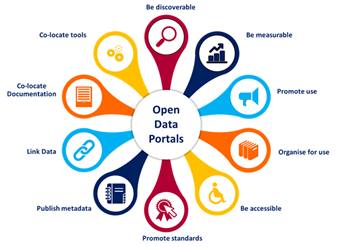Open Data: Spotlight on Veneto Region

“Open data is data that anyone can access, use or share.” (Open Data Institute)
In the digital age strategies, the importance of open data has increasingly come to the forefront of policymaking, recognising its potential to drive innovation, stimulate economic growth, and increase transparency in governance.
In this context, local governments across Europe are progressively adopting policies to make data more accessible to the public, aiming to foster the development of new technologies and services that can address societal challenges and boost local economic development.
The EU's framework for open data is built on the principle that public sector information should be open by default. This framework is designed to ensure that the amounts of data generated by the public sector are made available and easily accessible to citizens and businesses.
Regulatory framework and initiatives on open data: expanding the scope of re-use of datasets
Central to the EU's approach to open data are the directives on the re-use of public sector information, commonly known as the PSI Directive. The most recent revision (Directive (EU) 2019/1024) expands the scope of the dataset that must be made available for re-use. It also introduces the concept of high-value datasets, meaning that they have the potential to bring significant benefits to society, the economy, and the environment.
Last December 2023, the European Data Act entered into force, putting in place new rules for a fair and innovative data economy. While it aims to improve the availability of data for local development and to support local companies in leveraging open datasets, it also places a strong emphasis on privacy and the protection of citizens' rights, ensuring a balanced approach to open data initiatives.
Additionally, the EU has launched several initiatives to promote the use of open data, such as The European Data Portal, serving as a central gateway to access data published by public authorities across Europe.
Successful practices on the ground: the case of Veneto Region (Italy)
Since several years, Veneto Region (Italy) has developed a long term vision for the use of open data. It has started with several initiatives supported by funding from various transnational Interreg programs. These projects primarily tackled the technical aspects and challenges associated with open data. Following this first phase, the Region has decided to go further, and to lead the Interreg Europe project OD4GROWTH, which aims at strengthening the availability and processing of open data to support local growth and urban transformation.
The drive to embark on a project within Interreg Europe stems from an interest to capitalise on the exchange of knowledge and innovative practices among diverse local and regional authorities. This collaborative approach is aimed at fostering positive and tangible change at strategic, policy level.
Roberto Sandrini, Project Manager at Veneto Region highlights the region's history of initiatives focusing on open data, explains: “Open data is an emerging topic with a strong relationship to growth and public services. While some countries have a longstanding tradition of open data, others are just beginning to embrace it. Nonetheless, regional governments in Europe are increasingly adopting open data initiatives, and we want to be part of this journey”.
Veneto Region has put in place several initiatives designed to enhance the use of open data in the public sector, which include:
- A call for proposal co-funded by the Italian Recovery and Resilience Facility (PNRR) and the regional ERDF. More than 40 million € have been allocated to this call to finance more than one hundred “digital gyms” – palestre digitali in italian– and support high-qualified digital experts to use open data and transform it in innovative solutions and products for citizens and businesses.
- A broader strategy called Agenda Digitale Veneto 2025, covering different aspects of digital transformation of the public sector, including some ambitious initiatives on how to use open data for public health system, public transports, tourism…
Open data is also a crucial tool for addressing major global challenges such as land use monitoring, including the use of open satellite data. Veneto Region leverages this data to enhance urban planning decisions, as demonstrated by the "Mapping and Monitoring Urban Environment through Sentinel-1 SAR data" initiative within the Interreg Europe SATDISFACTION project. This exemplary practice highlights the role of satellite imagery in guiding strategic urban development, ensuring that planning is informed by precise and current environmental data.
Open data has immense potential to drive innovation, stimulate economic growth, and improve citizens' quality of life. To tap into this potential, it is essential for local governments to formulate robust policies and strategies that ensure the data are not only of high quality but also broadly accessible. “Open data is the result of transparency”, Roberto declares, highlighting the importance of setting the right framework for the flourishing of a mindset allowing a high-quality public administration and a fertile economic environment.
To go further
- Read our policy brief on the Digital transformation of public services
- Watch the recordings of our webinar on Open data for smarter cities
- Read the key learnings of our recent Workshop in Vilnius on the digital transformation of public services
